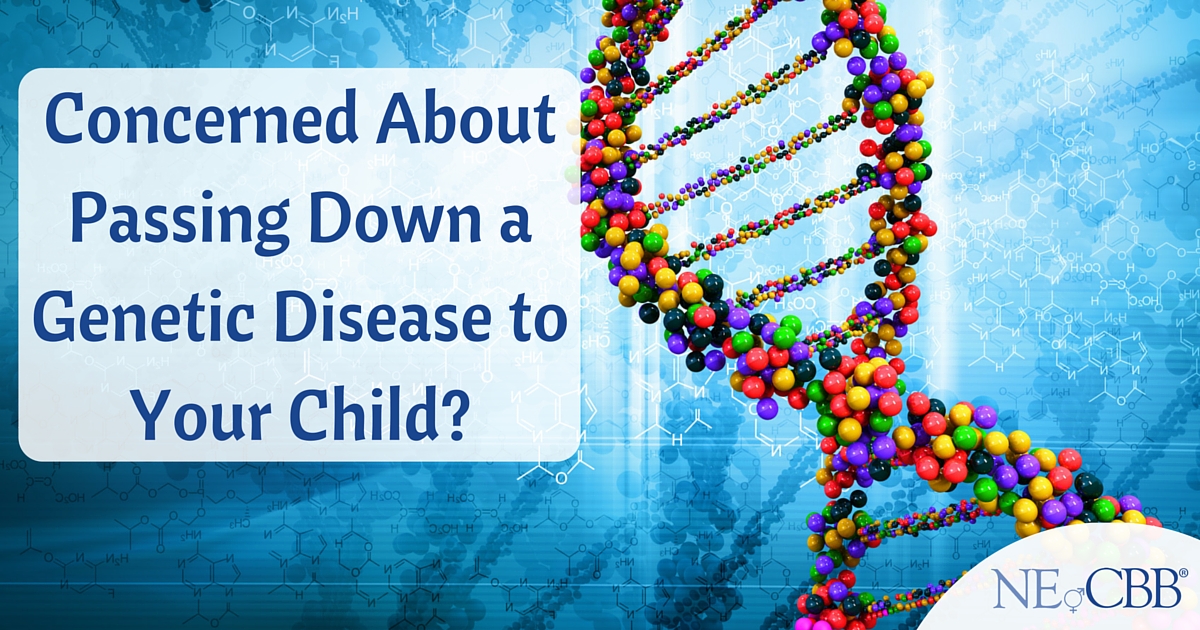 Is there a genetic disease such as cystic fibrosis, Huntington’s disease, or sickle cell anemia that runs in your family? Are you ready to start a family, but worried that you may pass down a genetic disorder to your unborn child? It’s a fear that many parents share, whether they know there’s a potential risk in their family health history or they don’t have enough information to be sure.
Is there a genetic disease such as cystic fibrosis, Huntington’s disease, or sickle cell anemia that runs in your family? Are you ready to start a family, but worried that you may pass down a genetic disorder to your unborn child? It’s a fear that many parents share, whether they know there’s a potential risk in their family health history or they don’t have enough information to be sure.
First, it’s important to know how the disease is inherited. In addition to other factors that may come into play, there are five main ways that genetic disorders are passed down:
- Autosomal dominant inheritance – In disorders such as Huntington’s disease and Marfan syndrome, only one parent needs to have the mutated gene which would be located on one of the first 22 pairs of chromosomes (autosomes). In these cases, there is a 50 percent chance that the disease will be passed down to the child.
- Autosomal recessive inheritance – Cystic fibrosis is one of the most common examples of autosomal recessive inheritance, and sickle cell anemia also falls this category. In disorders such as these, both parents must be carriers and the child inherits one mutated gene from each parent.
- X-linked dominant inheritance – Since this mutation is only on the X chromosome, there are differences between how males and females may pass down these disorders. A man with an X-linked dominant disorder will only pass down the condition to his daughters, while a mother with an X-linked dominant disorder has a 50 percent chance of passing down a disorder to all of her children. Fragile X syndrome is one example that can cause learning disabilities and cognitive impairment; males are typically affected more severely than females.
- X-linked recessive inheritance – In these cases, there is a similar pattern to the above. However, daughters are more likely to become carriers vs. actually be affected by the disease. Duchenne Muscular Dystrophy, some types of colorblindness, and hemophilia A are examples of X-linked recessive disorders.
- Y-linked inheritance – These disorders only affect males, and a man with a Y-linked disorder will always pass it down to his son. These defects are most commonly associated with Y chromosome infertility and defects in the development of male reproductive organs.
If a disorder in your family can be passed down to your child, you may be interested in genetic carrier testing of yourself and your spouse before starting a family. This can tell you whether one or both of you is a carrier for a specific disorder. Genetic testing is generally not covered by insurance plans and can be costly, so you should speak to your doctor about risks and family history before going down this path. If you are already pregnant, prenatal testing may be available to identify diseases carried by the fetus. As with carrier testing, you should always consult with your doctor to identify risks and implications.
Did you know that the stem cells within umbilical cord blood are currently being used to treat genetic disorders like Sickle Cell Anemia, Krabbe Disease, and 80+ diseases? Additionally, clinical trials are ongoing for many others, and the future looks bright for umbilical stem cell treatments for genetic disorders.
Want to learn more about the future possibilities of stem cell treatments using umbilical cord blood? Contact us today or connect with our community on Facebook.